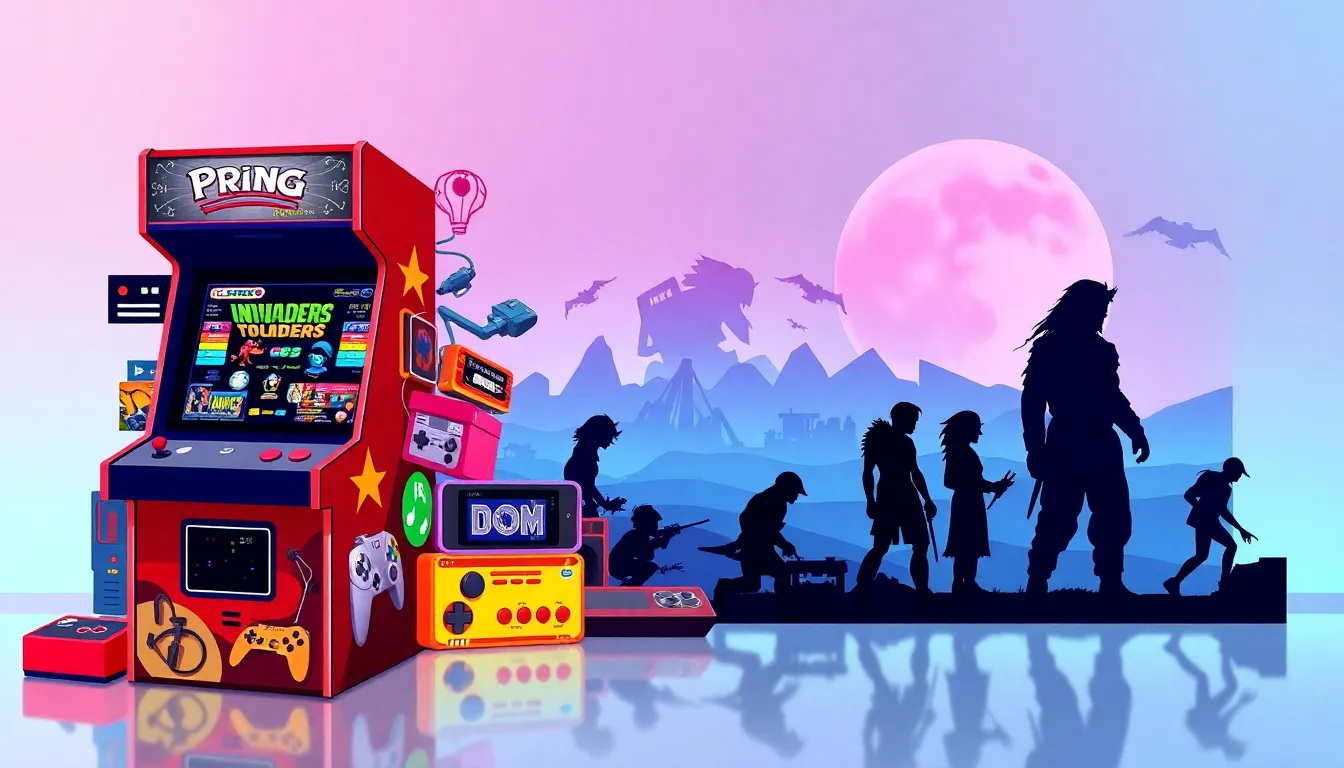If you think video games are just a way to escape reality, think again. Game facts reveal the incredible journey of an entertainment medium that has evolved at lightning speed. From humble beginnings with 8-bit graphics to immersive worlds full of complex narratives, the gaming industry is a dynamic realm filled with surprises. Buckle up as we dive deep into the fascinating evolution of video games, their societal impact, and what lies ahead. Get ready for a laugh here and there, because gaming is as serious as it is fun.
Game Facts

Key Milestones in Gaming History
The journey of video games is a tale of innovation and creativity. It all began in the 1950s with experiments in programming and the first rudimentary games. Fast forward to the 1970s, and arcade machines started popping up everywhere, introducing players to iconic titles like “Pong” and “Space Invaders.” The launch of the Atari 2600 in 1977 made home gaming a reality, paving the way for countless hours of fun.
The Rise of 8-Bit and 16-Bit Gaming
The 1980s marked the dawn of 8-bit and 16-bit gaming. Remember the nostalgia of blowing into a cartridge? Nintendo’s NES and Sega’s Genesis pushed the limits of gaming graphics and sound, introducing beloved franchises like Mario and Sonic. Players marveled at the evolution of pixel art and catchy chiptune music, turning gaming into a cultural phenomenon.
The Advent of 3D Graphics and Open Worlds
As technology improved, the gaming landscape transformed once again. The 1990s ushered in 3D graphics with titles like “Doom” and “Final Fantasy VII,” allowing players to explore three-dimensional environments. Open worlds became the norm, enabling gamers to wander freely in vast virtual universes, a trend that continues to evolve today.
Modern Gaming Trends
Impact of Mobile Gaming
In today’s fast-paced world, mobile gaming has exploded in popularity. No longer confined to living rooms, high-quality games are now at players’ fingertips, accessible anytime, anywhere. Trends like free-to-play models and addictive gameplay have made mobile gaming a dominant force, captivating audiences worldwide. It’s safe to say that the days of being glued to a console are over.
Virtual Reality: The Future of Gaming
Virtual reality (VR) is where the magic happens. Gamers can now immerse themselves in their favorite worlds like never before. From thrilling action to breathtaking adventures, VR offers unparalleled experiences. As technology advances, more games will make use of this fascinating medium, making players feel as though they’re stepping into another universe.
Esports and Competitive Gaming
Esports has transformed the gaming landscape into a thriving competitive arena. Professional players showcasing their skills in front of thousands, if not millions, of viewers have turned gaming into a spectator sport. With massive tournaments and lucrative prizes, esports is not just a trend: it’s a movement that’s here to stay.
Cultural Impact of Video Games
How Games Influence Society
Video games hold significant sway over cultural narratives and societal standards. They tell stories that can either challenge or reinforce societal norms. From exploring heavy themes like mental health in games like “Hellblade” to portraying diverse characters, games are becoming a powerful medium for social commentary. Players are not just interacting with games: they’re engaging with intricate worldviews.
Representation and Diversity in Gaming
For far too long, gaming has struggled with representation. But, the tides are turning. Today, more developers are prioritizing diverse characters and narratives. Games now feature protagonists from various backgrounds and genders, fostering a sense of belonging among players. This shift isn’t just positive: it’s necessary, as representation matters deeply in shaping younger generations.
Games as Educational Tools
Did you know that games are effective learning tools? Educational games engage players while teaching important skills. Subjects ranging from history to coding are being taught through interactive gameplay. With an exciting approach to learning, educational games are breaking the mold and showing that learning can be fun.
Behind the Scenes of Game Development
The Roles in Game Development Teams
Creating a game is not a one-person job. In fact, it involves a vibrant team of artists, designers, programmers, and marketers. Each role contributes to the final product, from crafting stunning visuals to building immersive worlds. Understanding the collaboration behind games adds a layer of appreciation for players each time they pick up a controller.
The Importance of Playtesting
Playtesting is where the magic meets reality. Before a game hits the shelves, developers put it through intensive playtests to identify bugs and ensure gameplay is smooth. Feedback from testers can lead to significant changes, enhancing player experience. It’s a vital step that underscores how much care goes into crafting those addictive gaming experiences.
Innovative Technologies in Game Design
The Role of AI in Modern Games
Artificial Intelligence (AI) is revolutionizing how games are designed and played. From creating more realistic NPC behavior to personalizing gaming experiences, AI is at the forefront of innovation. Players enjoy increasingly responsive environments and storylines that adapt to their actions, creating a richer gaming experience.
The Future of Augmented Reality in Gaming
Augmented reality (AR) is another frontier that’s gaining traction. Games like “Pokémon Go” have shown the world the potential of overlaying game mechanics with real-world environments. This technology offers opportunities for creative gameplay and social interaction, even while on the go. As AR continues to develop, the possibilities for engaging experiences are endless.
Sustainability in Game Development
Green Practices in the Gaming Industry
As the world becomes increasingly aware of environmental issues, the gaming industry is taking steps toward sustainability. Developers are implementing green practices, from reducing energy consumption in data centers to creating digitally distributed products that minimize waste. This shift not only contributes to environmental conservation but also allows gamers to support eco-friendly initiatives.
The Shift Towards Digital Distribution
Digital distribution has transformed how players access games. Gone are the days of physical copies cluttering up shelves. This evolution not only streamlines the purchase process but also dramatically reduces environmental impact. With a few clicks, players can access vast libraries of games, embracing convenience while supporting sustainability in the process.









